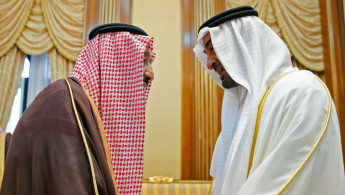Saudi Arabia, UAE pledge united front in Yemen war despite growing rift
Saudi Arabia and the UAE pledged on Monday to keep their floundering coalition in Yemen together after an Emirati troop pullout and the rise of the southern separatists they supported exposed growing rifts.
The statement, carried by both the Emirati and Saudi state news agencies, said both nations' "political, military, relief and development efforts" would continue.
It said the countries both rejected and condemned the "accusations and defamation campaigns targeting the UAE" since its decision in June to begin withdrawing troops.
The Saudi and Emirati foreign ministries also renewed a call for peace talks between Yemen's government and southern separatists, urging a ceasefire following deadly clashes.
The two countries "call for the speedy engagement in the Jeddah dialogue called by Saudi Arabia to address the causes and consequences of developments in some southern provinces", they said.
The kingdom, itself an autocracy, has a tightly controlled media that has whipped up nationalistic fervour since the rise of Saudi Crown Prince Mohammed bin Salman.
Prince Mohammed is thought to be very close to Abu Dhabi's powerful crown prince, Sheikh Mohammed bin Zayed Al-Nahyan.
Read also: 'Aden coup' sparks angry Twitter war between Saudi and UAE supporters
In August, the takeover of the southern port city of Aden by UAE-backed separatists also led to bitter online infighting between Emirati and Saudi intelligentsia, exposing a growing rift between the usually lockstep oil-rich nations.
The Emirati withdrawal followed rising tensions between Iran and the US over Tehran's collapsing nuclear deal with world powers, suggesting Abu Dhabi worried about having forces at home in case an armed conflict broke out.
While Emirati troops often weren't directly involved in front-line combat, they organised local forces and handled intelligence operations in Yemen's south.
Those forces included separatists seeking their own nation who have swept into areas to seize control from Yemen's internationally recognised government, leading to clashes between the supposed allies.
The UAE, an autocratic federation of seven sheikhdoms home to Dubai, has not publicly acknowledged how many troops it withdrew from Yemen.
Yemeni officials have suggested Emirati troop strength has dropped by as much as 75 percent out of around 10,000 troops.
In recent days, even the foreign minister of Bahrain, an island nation closely tied to Saudi Arabia, stepped into the fray to say on Twitter that the spilled blood of Emirati war dead "is not erased by statements that deny it".
The Saudi-led coalition intervened in support of the Yemeni government in 2015 when President Abedrabbo Mansour Hadi fled into Saudi exile as Houthi rebels closed in on his last remaining territory in and around Aden.
Since then, the conflict has killed at least 91,600 people, according to the Armed Conflict Location & Event Data Project, or ACLED, which tracks the violence.
The fighting has triggered what the United Nations describes as the world's worst humanitarian crisis, with millions displaced and in need of aid.





 Follow the Middle East's top stories in English at The New Arab on Google News
Follow the Middle East's top stories in English at The New Arab on Google News
![Israeli forces ordered bombed Gaza's Jabalia, ordering residents to leave [Getty]](/sites/default/files/styles/image_330x185/public/2176418030.jpeg?h=a5f2f23a&itok=_YGZaP1z)

